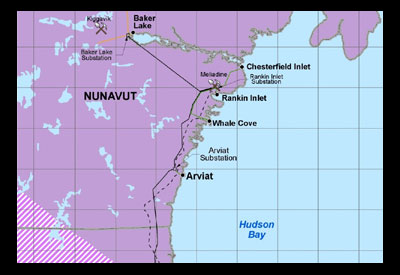Study Says $904 Million Manitoba-Nunavut Hydro Link Is Economically Viable

A scoping study conducted by Montreal engineering firm BBA Inc. concludes that extending transmission lines north from Churchill, MB up the western Hudson Bay coastis economically viable, environmentally beneficial, and should proceed without delay. The $904 million project could be completed by 2025 if a feasibility study begins by early 2016, the study authors say.
Image: The transmission line route would travel over continuous permafrost, indicated by the sold purple background (Image courtesy of BBA).
The study suggests the project would pay for itself over an estimated 40-year lifetime, delivering projected savings of $40 million a year by replacing fossil fuels from dirty, expensive diesel generators with cleaner, cheaper hydroelectric power.
The study was commissioned by the Kivalliq Inuit Association on behalf of the Energy Options Working Group (EOWG), established under Hudson Bay Regional Roundtable. The roundtable is a government body that addresses issues and creates opportunities for remote communities connected to Hudson Bay.The roundtable is co-chaired by the Manitoba Minister of Aboriginal and Northern Affairs and the Nunavut Minister of Community and Government Services.
In a joint statement, EOWG co-chairs Mayor Bob Leonard of Arviat, Nunavut and Mayor Michael Spence of Churchill, Manitoba stated “We hope that this report acts as a basis for future study and action so that Nunavummiut in the Kivalliq region will have access to environmentally-friendly, sustainable, and affordable energy while making the region more attractive to increased economic development and private investment.”
Next steps include funding requests to the governments of Nunavut, Manitoba and Canada for a briefing and feasibility study.











![Guide to the Canadian Electrical Code, Part 1[i], 26th Edition– A Road Map: Section 56](https://electricalindustry.ca/wp-content/uploads/2022/11/Guide-CE-Code-2.png)



